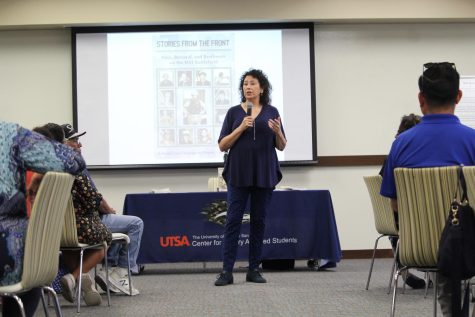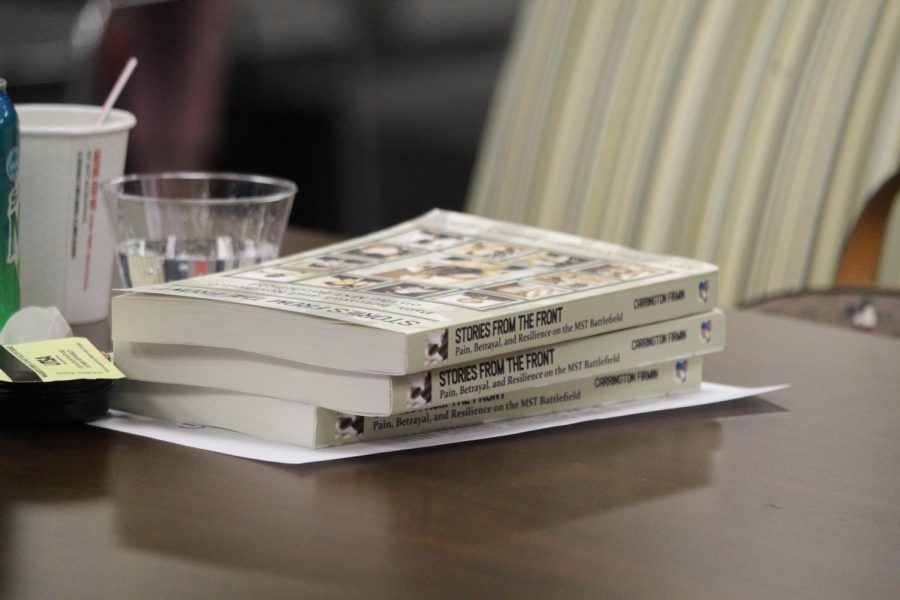UTSA hosts book signing for military sexual assault trauma novel ‘Courageous Conversations’
May 25, 2022
Trigger warning: Mentions of rape and sexual assault
On Thursday, April 28, UTSA Veteran and Military Affairs hosted Colonel Lisa Carrington Firmin and contributing author Sandra Morissette’s “Courageous Conversations” book signing event. The event — meant to raise awareness about culture, diversity, discrimination and sexual assault in the military — was followed by discussions from their newly, “Stories from the Front: Pain, Betrayal, and Resilience on the MST Battlefield,”
The book covers stories from fourteen veterans— including Colonel Firmin’s — and their experiences within the military regarding discrimination and sexual assault.
Colonel Firmin shared experiences early in her career when entering the service.
“I came in 1980, and the percentage of women in the military were very small … My first assignment was in a very hyper-masculine fighter squadron, fighter pilots. No women, because women could not be fighter pilots back then. So here I am, I’m a Latina, I’m really young, and I just did not fit. It was very difficult, there was a lot of extreme hazing going on … “ Firmin said.
“There were no women role models for me at all, so I aspired to be like the white pilots that ran the Air Force. I wanted to be just like them, and I adopted their leadership styles and mannerisms. It shaped me, and I do believe I was brainwashed when I came in the military and those who have gone through basic can probably agree. It really shaped me early on, and I normalized very bad behavior. I accepted just the way it is. Prove your excellence, work hard and then you can say something. So I kept trying to prove it, to prove I could lead, that Latinas could lead, be excellent, and I did at all. But at what cost did I do it?”

Colonel Firmin emphasized her work and achievements both in and out of the military.
“ A combat vet, I have a bronze star, I’ve led many organizations, founder of this veteran military affairs organization here at UTSA. But at what cost?” Colonel Firmin said.
Colonel Firmin then explained the beginnings of coming forward with her story.
“I’m a great compartmentalizing person, I really buried this stuff. These last couple of years have been traumatic for me just to start thinking and remembering and part of it was Coronavirus. I started talking on virtual panels about harassment, but I didn’t talk about sexual assault. I actually had to go look up the definition of sexual assault, and then I walked away like yeah. All that … and frankly I totally forgot I had been sexually assaulted in initial training and that’s even before I became a lieutenant. I had buried it so deeply,” Colonel Firmin said.
Colonel Firmin spoke of her journey to healing and moving forward with her mental health.
“I’ve never shared, I’ve never been vulnerable. And for the first time in my life, I’m authentic. I’m telling you what it’s really like you know, and the amount of power that came with that is unbelievable. I never would have thought that I wrote in the afterword how I never sought out treatment in the military because it goes against everything I was taught. It shows weakness, you know, and … you can’t do that you’re a commander, you’re a leader. You can’t do that. It’s amazing what it’s done for me … I’m undergoing EMDR therapy, Eye Movement Desensitization Reprocessing therapy, and … its combat trauma as well as MST. And I never would’ve publicly said to anybody, I have PTSD and I’m in therapy,” Firmin said.
Along with personal experiences, Colonel Firmin shared the impact of other women in the military whom the system had failed, which took part in her motivation to share her story.
“And then I always questioned why I lived, why I came home from Iraq. And maybe, maybe to help, help the movement along and create change. But you know, maybe because a lot of us who served in combat have survivor’s guilt, you know, and it’s real … But hey, if I can help one person, if I can help prevent another Vanessa Guillen, there [are] more names Asia Graham, you know, Lavena Johnson, there [are] more names and they’re dead. They’re not here anymore. You know, so I need to speak up for them,” Colonel Firmin said.
Colonel Firmin acknowledged the steps the U.S. military has taken as well as future changes necessary.


“Just the end of December a law was passed to make sexual harassment a crime and take sexual assault harassment outside the chain of command for military justice, but that’s the law. That’s military justice law, and I applaud those efforts and the change you’ve made, but that’s not going to change the culture. Changing the culture is going to be up to all of us, as we read and learn to become more aware and educated and then to stand up,” Colonel Firmin said.
Colonel Firmin continued explaining her unique process in releasing her book.
“And, you know, no one, my publisher told me that I probably couldn’t do this book this quickly. I picked the date of release before I wrote the book. I said I want the book released on the second anniversary of Vannessa Guillen’s murder, April 22. My publisher goes, Lisa, that’s less than a year away. I said I can do that …You’re underestimating this Latina’s ‘Ganas.’”
The book is now available on Amazon and Blueearbooks.
Interview with Colonel Firmin
Q: What inspired you to come forward with your story?
A: I think the primary reason was that this issue is still occurring in the military despite the military’s effort today and then the tragic horrific murder of Vanessa Guillen really catapulted me on this journey of reflection and just facing what really happened in my early years in the military.
Q: How have you been affected since the book release?
A: People are coming up to me and this happened after I wrote some previous articles about this in the last year but more so now that the book is out. People are contacting me and they’re telling me their stories. They want to share their own experiences, what happened to them, so it’s overwhelming at the number – the sheer number of people out that are out there that have experienced military sexual trauma, sexual harassment, sexual assault, or disparities while serving. I think that the fourteen stories in my book gives voice to some people – that don’t have a voice or feel like they can’t speak up for a variety of reasons.
Q: Have you received any backlash?
A: No, not from the book. It just came out, so I imagine that there will be backlash, there will be some haters, there’ll be people who say “Why didn’t you speak up years ago, and why are you speaking up now?” and that kind of thing. So I imagine there will be, but I wrote the book to educate people on this serious issue and how widespread it is.
Q: Do you believe the military still has a long way to go in regards to handling sexual assault, where it could take a couple of years to be handled correctly?
A: It’s going to take longer than that … because the law recently changed … sexual assault and sexual harassment will be taken out of the chain of command in the military for seeking justice. Military laws have been recently changed, but it’ll take a while for that to catch on and for them to work these new changes, and to ensure people do receive justice. Changing the climate in the military is going to take a lot longer.








